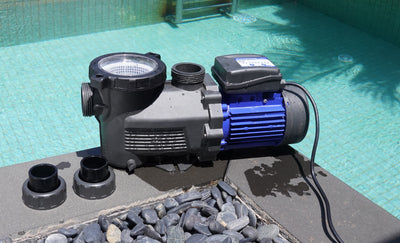Pool Closing Kits: What Chemicals Do You Really Need to Winterize Your Pool?
When it’s time to close your pool for the winter, you may be wondering if a pool closing kit is worth the investment. These kits typically come with a variety of chemicals and supplies to help protect your pool through the colder months, but do you really need everything they include? Let's break down the essential chemicals for closing your pool and determine which products are necessary—and which ones might be optional.
What’s Inside a Typical Pool Closing Kit?
Winterizing pool kits usually contain a selection of chemicals and pool supplies designed to keep your water clean, balanced, and algae-free during the off-season. Here’s a list of the typical contents you’ll find in these kits:
- Algaecide
- Enzymes
- Scale and Stain Preventers
- Chlorine-Free Shock
- Pool Accessories (like Air Pillows, Time-Release Floaters, and Absorbing Sponges)
While these kits are convenient and can save you time, you don’t necessarily need every single item they include. Below, we’ll discuss which chemicals are essential for closing your pool properly and which items you can skip.
Step 1: Prepping Your Pool
Before you add any winterizing chemicals, it’s important to ensure your pool is properly cleaned and balanced. Here are the essential pre-closing steps:
-
Skim, Brush, and Vacuum Your Pool
Remove any debris and clean the pool walls to prevent buildup over the winter. Anything left behind will only make the reopening process more difficult. -
Test and Balance Your Pool Water
Test the pH, alkalinity, and calcium hardness levels to ensure they are within the recommended range. Properly balanced water ensures that your winter chemicals work effectively. -
Shock Your Pool
Shocking your pool is crucial for eliminating any remaining bacteria and algae. This process will help prevent algae blooms when you open your pool in the spring. Use a chlorine shock for best results, and allow it to circulate overnight.
Step 2: Essential Pool Winterizing Chemicals
Once your pool is prepped, it’s time to add the winterizing chemicals. Here are the chemicals that are most important for a successful winterization:
-
Winter Algaecide
Adding algaecide before covering your pool helps prevent green water and algae growth throughout the winter. A copper-free algaecide with 60% Polyquat is a great choice, as it’s strong enough to fight algae and won’t stain your pool surfaces. -
Slow-Release Winter Ball or Winter Pill
A winterizing ball or pill slowly releases a blend of enzymes, clarifiers, and stain & scale preventers over the off-season. This is an excellent choice for extra protection, especially if your pool water has high metal content or you're prone to stains and scaling. It’s an easy, one-step solution, but optional. -
Stain and Scale Preventer
Many pool kits include a stain and scale prevention chemical. However, if you’ve properly cleaned your pool and are using a quality winter cover, you may not need to use an additional stain and scale treatment. A well-maintained pool cover will help protect against debris, which is the main cause of staining and scaling. -
Chlorine-Free Shock (Oxidizer)
Some kits include a chlorine-free shock (oxidizer) to add to your pool during the closing process. However, if you’ve already shocked your pool with chlorine as part of your prep work, you likely don’t need to use this product again. Check your chlorine levels and ensure they’re within range before skipping this step. -
Phosphate Removers
Phosphate removers are marketed as a way to starve algae by removing its food source. However, if you've already cleaned your pool, applied algaecide, and ensured good winter cover protection, this product is usually unnecessary. -
Time-Release Floaters or Absorbing Sponges
Some kits include floaters or sponges that release cleaning agents or absorb oils throughout the winter. While these products may be useful, they are not essential if you've already added an algaecide and ensured that your pool is clean and properly balanced. -
Air Pillows (for Above-Ground Pools)
If you have an above-ground pool, an air pillow is a must. It helps prevent ice damage and protects your pool walls from collapsing under the weight of freezing water. If you have an inground pool, you likely don't need an air pillow unless you're concerned about potential ice damage.
Are Pool Closing Kits Worth It?
In general, pool closing kits can be a convenient all-in-one solution, saving you time and effort when preparing your pool for the winter. However, if you're looking to save money or you already have some of the essential chemicals on hand, you might not need everything that comes in a typical pool winterizing kit.
What You Really Need:
- Polyquat 60% Algaecide: A must-have to prevent algae growth during the winter.
- Winterizing Ball or Pill (Optional): Provides additional protection against stains and scaling.
- Chlorine Shock: Shock your pool a few days before closing to eliminate contaminants.
If you have these items and ensure your pool is well-balanced, you can safely close your pool without needing to buy an entire kit. And, of course, make sure your pool is covered with a quality winter cover to keep out debris and protect your water.
Conclusion
Closing your pool for the winter doesn’t have to be complicated or expensive. With the right chemicals—like a good algaecide and chlorine shock—you can protect your pool and ensure it’s ready for a smooth opening when the warmer months arrive. Whether you use a pool closing kit or purchase individual chemicals, the most important thing is to properly prep your pool, balance your water, and add the necessary winterizing chemicals.

